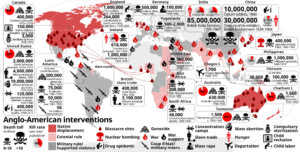Problem
The United States has the most notorious foreign policy in the world: make an offer, and bomb or sabotage if the offer is turned down. While China hasn’t dropped a bomb in nearly 40 years, the U.S. drops an average of 40 bombs per day on numerous countries across the globe. The U.S. has been at war for its entire history but 20 years. The Pentagon regularly invades, conquers, and occupies foreign countries in violation of international law. It funds ethnic cleansing, genocide, and commits every possible war crime—terrorism, torture, using starvation as a weapon of war, extrajudicial killings, taking hostages, forced deportation/displacement, etc. This activity of ongoing extermination, intimidation, and imperialism wastes American life, destroys entire societies, and produces endless hatred towards America and its citizens across the globe. It also wastes trillions of dollars that could go towards improving American society and building friendly foreign relations.
The U.S. also dehumanizes and vilifies immigrants attempting to survive and improve their own lives after being destroyed by western imperialism.




Solution
Building on the 37th Amendment, the 40th Amendment establishes sound principles of foreign policy, prohibits needless interventions and invasions, occupations, violations of international law, war propaganda, and establishes sound trade and immigration policies.
The Text of the 40th Amendment
Section 1. Principles of Foreign Policy
The United States shall prioritize and pursue a foreign policy of diplomacy, cooperation, and collaboration that minimizes military intervention and coercion. The government and military shall pursue policies that reduce incentives for war and violence, that promote world peace, and strategically resist the dominating, unethical, and destructive tendencies, policies, and effects of neoliberalism, colonialism, neocolonialism, imperialism, and statist totalitarianism.
Section 2. Military Strategy
Military operations must always be defensive in nature, not act on behalf of private monetary interests, and not be colonizing or expansionary in nature. They must not be carried out on behalf of other political entities unless approved by a two-thirds 2/3 vote of both the House and the Executive Board. In any military engagement, the Executive Board, shall intensely, habitually, and consistently seek to minimize civilian casualties, damage to critical infrastructure upon which sentients depend, and the displacement of peoples and animals.
Section 3. Abstention from Intervention and Invasion
The government shall not overthrow other foreign governments; occupy another country without a three-fifths (3/5) vote of 10% of the country’s residents; instigate or fund coups; interfere in the elections of other countries; conduct assassinations of foreign persons (whether deemed a threat or not); conduct acts of terrorism, that is, any action intended to cause death or serious bodily harm to civilians or non-combatants with the purpose of intimidating a population or compelling a government or international organization to do or abstain from certain acts; conduct acts of torture/enhanced interrogation; issue economic sanctions to encourage, fund, or conduct regime change (restated 30th Amendment); engage in so-called preventive wars; issue predatory loans to economically vulnerable countries; participate as voting members in financial institutions that issue predatory loans; issue economic sanctions that will likely result in the mass starvation or oppression of entire populations near or far; or engage or support in any form of settler colonialism, ethnic cleansing, genocide, nakba, or the like.
Section 4. Military Bases
The government shall not establish military bases or outposts in any foreign country unless the majority of the people in said country approve them by a public referendum with a three-fifths (3/5) majority vote with a ten percent (10%) quorum of permanent residents; foreign or occupying military agents or forces may not count towards the quorum, whether from the United States or not.
Section 5. Subjection to International Law
Unless in conflict with Section 9 and unless overturned by a two-thirds (2/3) vote of both the People’s House and the Executive Board, the government shall adhere to the Geneva Conventions, Genocide Convention, and Rome Statute and be subject to international courts that enforce them.
Section 6. Limits to Borrowing
The government shall not lend or borrow more than twelve percent (12%) of its total budget to lenders or borrowers, whether foreign or domestic. The government may not lend or borrow any loan that is greater than 12% annual interest. Furthermore, the government shall not allow the gross federal debt to reach insolvency.
Section 7. Abstention from War Propaganda and Mandatory Declassification
The government, military, and its agencies shall not conduct mass propaganda campaigns of misinformation or disinformation to manufacture public consent for war. They shall neither lie about atrocities committed by real or perceived enemies, nor coverup atrocities committed by the American military or its allies. All classified files not considered an imminent threat to national security by the Supreme Court shall be automatically declassified within six (6) years of their occurrence.
Section 8. Trade Policy
The government shall not engage in any trade agreement, embargo, or commercial activity that will likely lead to severe humanitarian consequences or that will likely threaten the food or water security of other peoples or of its own citizenry. Furthermore, no trade agreement is valid that has not first achieved a three-fifths (3/5) vote of the People’s House.
Section 9. Participation in International Bodies
The government may not participate in any international body or organization that does not operate democratically according to simple majority (50%+1), significant majority (3/5), or super majority (2/3) rule. Furthermore, the government may not participate in any committee, governing body, assembly, or council, local or abroad, that gives any single voting member exclusive veto power, or that gives greater voting power to members solely on the basis of having greater financial resources.
Section 10. Immigration Policy
Every person within the United States, regardless of immigration status, shall enjoy equal protection of the laws and fundamental human rights. The government shall establish a pathway to citizenship for undocumented individuals, prioritizing family reunification and humanitarian considerations. Immigration policies shall ensure fair and efficient processing and prevent discrimination. All individuals in immigration disputes shall be guaranteed due process, legal representation, and fair hearings. Families with members under the age of sixteen (16) shall not be separated at the border under any circumstances. Immigration policies shall prioritize accepting war and climate refugees, without excluding work and educational permits.
Section 11. The Right to Transnational Movement
Every citizen has the right to freely leave and re-enter their country without undue restriction. The government shall not infringe upon this right except in cases of national security, public safety, or criminal justice, as determined by law. No citizen shall be arbitrarily deprived of the right to travel internationally, and, as applicable, has the international right of persons to leave the place of oppression.
Section 12. Schedule of Implementation
Existing foreign military bases found out of compliance with Section 4 within one (1) year of approval shall be shut down and vacated within sixty (60) days thereafter. Current loans out of compliance with Section 6 must be brought into compliance or canceled within twelve (12) years. Current trade policies that are not in compliance with Section 8 shall be nullified and invalidated within three (3) years. Participation in international bodies that is out of compliance with Section 10 must cease within three (3) years. All other provisions of this Amendment shall be effective immediately upon approval.